- Home
- Joy Fielding
The Final Act Page 21
The Final Act Read online
Page 21
The phone rang.
“I’ll get it.” Leigh was instantly at the phone. “Hello?” Immediately her face darkened. “Who is this?”
“Who is it?” Cindy echoed.
“You sick fuck!” Leigh slammed the phone into its carriage.
“Who was that?” Cindy asked, more amused than alarmed by her sister’s outburst. “Who was that?” she asked again, although she already knew the answer.
“What difference does it make? They’re all the same.”
“What’d this one say?”
“The usual crap.”
“Such as?”
“I have your daughter. I’m going to cut her up into little pieces. Yada, yada.”
Cindy shook her head, amazed, though no longer surprised, by the cruelty of others. The police had warned her about all the twisted minds out there, the perverts who feasted on other people’s suffering, who wallowed in their misery. Hang up, they’d told her. Better still, don’t answer your phone. Sometimes Cindy heeded their advice. Other times, she didn’t.
Ten minutes later, the phone rang again.
“I’ll get it,” Cindy said, this time beating her sister to the phone.
“Honestly, Cindy, you almost knocked me down.”
“Hello,” Cindy said.
“Hi, yourself,” the voice answered.
The voice was both husky and light, soothing and creepy, alien and familiar. An obvious attempt at disguise. Why? Was it someone she knew?
“Who is this?”
“Have you seen the morning papers?”
“Who is this?” Cindy repeated.
“They think Julia might be the victim of a serial killer.”
“Who is it?” Leigh asked impatiently. “What’s he saying?”
“It would serve her right,” the voice continued. “Your daughter’s a slut, Cindy. She’s nothing but a cheap whore.”
A sharp cry suddenly stabbed at the air, tore through the phone wires, pierced Cindy’s ear.
“My God,” Cindy said, feeling her face drain of blood as she identified the sound.
“For heaven’s sake, Cindy,” Leigh said, “hang up the damn phone.”
Cindy held her breath, listened for the sound again. It didn’t come, but it didn’t matter. Cindy knew exactly what it was.
The sound of a baby crying.
“Faith?” Cindy whispered.
The phone went dead.
In the next second, Cindy was out of the kitchen and at her front door, Leigh following right behind.
“Where are you going? What are you doing?” her sister shouted after her, as Cindy ran down the steps and cut through the bushes into her neighbor’s front yard.
Cindy felt Leigh’s hand on her arm, tried shaking it away, but Leigh’s fingers were like stubborn vines, refusing to be severed with a simple shrug. “Let go,” Cindy hissed between tightly gritted teeth as she yanked her arm away.
“Cindy!” she heard Leigh shout as she raced up the front steps of the Sellick home, not looking back.
The door opened just as Cindy reached the top step. “Cindy!” Faith exclaimed, clearly surprised to see her. She closed the door behind her and adjusted the green corduroy Snuggly at her breasts. Inside it, Kyle was sleeping soundly, his eyes tightly closed, his lips sucking contentedly at his pacifier. “What’s happened? Has there been any news?”
“Did you just call me?” Cindy asked.
“What?”
“Did you just call me?”
“Call you? No. Why?”
“You didn’t just phone me?”
“What’s going on?” Faith glanced past Cindy to Leigh, who was now standing at the bottom of the stairs.
Leigh lifted her hands into the air, as if to say, you tell me.
“Somebody just phoned my house. I heard a baby crying in the background.”
“Well, no wonder you thought it was me.” Faith smiled, tenderly stroking the top of her baby’s head. “It wasn’t Kyle. Believe it or not, he’s been sleeping like an angel all morning. I really think we’ve turned a corner. Are you okay? You don’t look so hot.”
“Come on, Cindy,” Leigh was saying. “We’ll let the police handle it.”
“The police?” Faith asked.
“They’re tapping the phone.”
“The police are tapping your phone? Why?”
“We’ve been getting a lot of crank calls,” Leigh explained. “Which wouldn’t happen so often,” she continued, reaching for Cindy’s hand, “if my sister would get Caller ID.” She guided Cindy down the stairs toward the sidewalk. “We’ll take the long way home, if you don’t mind.”
“I’m sorry I yanked your arm like that,” Cindy said.
“Don’t give it another thought.”
*
“SHE ALMOST BROKE my arm, she yanked it so hard,” Leigh told her mother as soon as she returned from walking the dog.
“You yanked your sister’s arm?” their mother asked Cindy incredulously, following the dog into the kitchen. “Hmm, what smells so good?”
“I’m making a lemon cake,” Leigh said.
“You shouldn’t fight with your sister,” her mother said with a shake of her head. “Honestly, I can’t leave you girls alone for a minute.”
The phone rang.
“Don’t answer it,” Leigh instructed.
“Maybe it’s Julia,” Cindy said hopefully.
“This wouldn’t happen if you had Caller ID,” her mother said.
Cindy picked up the phone, braced herself for the worst.
It was Meg. “How’re you doing?” Her voice sounded rushed, as if she were talking while running. Which, of course, was exactly what she was doing, Cindy realized, picturing Meg racing along Bloor Street, trying to get from one movie to the next as quickly as she could, desperate not to miss anything. The festival had been up and running for two days now, and although neither Meg nor Trish had so much as mentioned the festival, Cindy knew they were going without her.
Life goes on, she understood, wishing she could press a button, freeze time as easily as she could freeze an image on her television screen.
She knew she shouldn’t judge Meg and Trish harshly. Her friends couldn’t be expected to drop everything, abandon all their plans, put their lives on hold, because of something that didn’t directly concern them. She shouldn’t resent them for enjoying themselves, for laughing, for forgetting about her for hours at a stretch. She shouldn’t, she thought. But she did.
“I read in the paper about that other missing girl,” Meg said, as a car honked in the background. “What do the police really think?”
Cindy shook her head, said nothing.
“Look, you must be going stir-crazy over there. Why don’t you come to a movie with us?”
“A movie?”
“I know it sounds frivolous, and I don’t mean to sound insensitive. I just think it might be a good idea for you to get out of the house for a while, get some fresh air, get away from your mother, take your mind off everything.”
“You think it’s that easy?”
Meg sighed the sigh of the deliberately misunderstood. “Of course it’s not that easy. I didn’t mean to imply. . .”
“I know. I’m sorry.”
“Will you think about it?”
“Sure,” Cindy said, although she had no intention of doing so.
“Call me on my cell. I’ll keep it on all day.”
Cindy smiled, recalling how enraged festival patrons got whenever anyone’s cell phone rang during a screening.
“I love you,” Meg said.
“I love you too.”
Her mother and sister were staring at her from across the room, their bodies tensed to take action at the first sign of distress. Ever since Cindy had fainted, their eyes were on constant vigil, never allowing her far out of their reach. She wondered whether anyone would ever look at her the way they used to—without pity, without sadness, without fear.
Cindy shook her head
, trying to rid her brain of such depressing thoughts. Meg was right—she was going stir-crazy. She needed air.
“I’m going upstairs to shower,” her mother said. “Why don’t you lie down for a while?”
“Because I’m not tired,” Cindy said.
“You’re sure?” Leigh asked as their mother left the room.
Cindy sank into one of the kitchen chairs, watched as her sister began preparing the icing for the cake. “You don’t have to do this, you know.”
“I know.”
“Have you spoken to Warren today?”
“Of course.”
“I’m sure he’s wondering when you’re coming home.”
“He’s fine. He’ll be over later.”
Cindy nodded. “Is everything all right?”
“What do you mean?”
“Between the two of you?”
“Of course it’s all right,” Leigh said. “Why wouldn’t it be all right?”
“I don’t know. I’m just asking.”
“Everything’s fine.”
“Good.”
“Warren’s a good man. Not the most exciting man in the world, maybe. Not like Tom. . .”
“Thank goodness.”
“But he’s sweet and he’s decent, and he’d never cheat on me.”
“I didn’t mean to imply. . .”
“I don’t understand why you’d ask me something like that.”
“I’m sorry. I honestly didn’t mean. . .”
“It’s just this damn wedding. You know. People get tense.”
“I’m sure.”
“It’s a huge expense, and we’re not getting any help from the groom’s parents. I’ve told you.”
“Yes.”
“So there’s bound to be tension. Especially now, with Julia missing, and everything so up in the air.”
“I’m sorry.”
“There’s nothing to be sorry for. We’re fine.”
“Good.”
The doorbell rang.
“I’ll get it,” Cindy said, walking briskly to the front door, trying to sort out in her mind what had just happened.
“Check who it is before you open the door,” Leigh called after her.
It was the police. Cindy held her breath as she tried reading the expressions on their faces.
“Can we come in?” Detective Bartolli asked.
“Oh God.” Cindy fell back into the house, covered her mouth with her hand, as Leigh rushed to her side.
“What’s happened?” Leigh asked, as Cindy struggled to stay upright.
“It’s all right,” Detective Gill assured the two women quickly. “We’ve just come to fill you in on what’s been happening.”
“Julia . . .?”
“There’s nothing new.”
“Can we come in?” Detective Bartolli asked again as Elvis bounded down the stairs to jump against his thighs.
Cindy led the two men into the living room, motioned for them to sit down. Above her head, Cindy could hear the water from the shower running through the pipes.
“I assume you’ve heard about the Hanson girl,” Detective Gill stated as he lowered himself onto one of the tan leather sofas.
“Do you think there’s any connection?” Cindy asked.
“We have no reason at this time to assume the two incidents are related,” came the automatic response from Detective Bartolli.
“But you think there’s a chance?”
“It’s a possibility,” Detective Gill admitted. “We’re looking into it.”
“How exactly are you doing that?” Leigh asked.
The detectives exchanged glances, ignored the question. “We’ve had several conversations with Sean Banack,” Detective Bartolli said.
“And?”
“We’re still checking out his alibi for last Thursday. Unfortunately, because we don’t know the exact time your daughter disappeared . . .”
“We know it was between eleven-fifteen and four-thirty,” Cindy said.
“Yes, but that’s a lot of time to account for. Sean can account for his whereabouts for part of the day, but not all.”
“Then arrest him.”
“We need evidence to arrest him,” Mrs. Carver.”
“That story he wrote. . .”
“Not enough.”
“We’ve had someone watching him,” Detective Gill said.
“And?”
“So far, nothing.”
“Have you talked to Lindsey Krauss?”
Detective Bartolli checked his notes. “Yes. And to the other names on the list your husband gave us.”
“Ex-husband,” Cindy said.
“Ex-husband, yes. Sorry about that.” The detective smiled sheepishly, scratched at his ear. “The consensus among several of Julia’s friends is that she was involved with a married man.”
“That’s ridiculous,” Leigh said.
Cindy said nothing.
“Cindy?” her sister said.
“Have you talked to Ryan Sellick?” Cindy asked.
“He denies any romantic involvement with your daughter.”
“Do you believe him?”
“Is there some reason we shouldn’t?”
Cindy shrugged, filling the policemen in on everything that had taken place in the last week between herself and the Sellicks. She watched Detective Gill dutifully jot this information down, and wondered whether she really believed Ryan and Julia were having an affair, whether Faith had phoned her earlier, whether either one could have played a part in her daughter’s disappearance. “What about Michael Kinsolving?” she asked.
“We have no evidence to suggest he was in any way involved.”
“He left town right after he saw Julia,” Cindy reminded them.
“He claims he was in the country, scouting locations.”
“And? Was he?”
“We’re still checking into that.”
Cindy lowered her head. “So, basically what you’re telling me is that we’re no farther ahead than we were last week. Except now, another girl has disappeared.”
“Mrs. Carver . . .”
“I know. There’s no reason to assume the two cases are connected.”
An hour later, Cindy was lying on her bed, looking through her festival catalog. In the section marked Masters, she found a photograph of what appeared to be an ambulance or a police car racing along a dark, metropolitan street, the deliberately blurred image bathed in an eerie orange-red light, a woman’s darkened silhouette in the foreground. The notes underneath it read: Lost, Michael Kinsolving’s sensational new film deals with the underside of contemporary society, with disaffected youth and the appalling generation who created and raised them. We meet Catherine, age twenty-two and already a seasoned con artist, and her sister, Sarah, five years her junior, addicted to cocaine and men old enough to be her father.
Cindy closed the book, rifled through the envelope of movie coupons Meg had left for her, then scanned the Volkswagen Guide to the Festival Official Film Schedule booklet, locating the listing for Lost. Tonight at seven-fifteen at the Uptown 1, she read, reaching for the phone.
“Hello?” Meg answered, her voice a hoarse whisper. “Cindy?”
Cindy pictured Meg crouching down in her seat in the darkened theater, felt the angry glares of the people sitting around her.
“I’ll meet you inside the theater at seven,” Cindy said, then hung up before she had a chance to change her mind.
TWENTY-ONE
THE Uptown I was already filled to capacity by the time Cindy arrived at just after seven o’clock that evening. She searched through the dim light of the large, old-fashioned auditorium for her friends, praying she wouldn’t run into anyone else she knew. She could only imagine what they might say. Can you believe it? Her daughter’s been missing for over a week, God only knows what’s happened to her, and she’s out gallivanting around. She’s going to the movies!
And they’d be right, Cindy thought, wond
ering what the hell she was doing here. Did she seriously think she’d glean anything of significance from Michael Kinsolving’s new film? That there’d be hidden clues pointing to her daughter’s whereabouts? That she’d gain insight into the director’s tortured psyche? Or had she merely been desperate to get out of the house? Away from her mother, her sister, the dog? What is my objective? she asked herself, twisting sharply around, fleeing the crowded auditorium for the equally crowded lobby, coming to an abrupt halt in front of a long table covered with sushi and exotic sandwiches.
“Can I help you?” A young woman stared at her expectantly from behind the food-laden table.
Cindy suddenly realized she was ravenously hungry, not having eaten anything since breakfast, despite Leigh’s constant efforts to stuff food down her throat. She’d pleaded exhaustion when Warren invited them all out for dinner, insisting her mother and sister go without her, then vaulted from the house the minute they were gone. She’d left them a note—Needed some air. Back by ten, she’d scribbled—so they wouldn’t worry. Although they’d worry anyway, she knew, guilt sitting heavy in her chest, like heartburn. She’d grab a sandwich and head straight for home, she decided now. Coming here had been a mistake. What had she been thinking? “What kind of sandwich is that?” she asked the pale-faced young woman whose name tag identified her as a festival volunteer.
“Tomato, Havarti cheese, and avocado on whole wheat.”
Cindy nodded her approval, her mouth watering as she reached inside her purse for some money.
“I’ll get that,” a man said from somewhere behind her, and Cindy turned to see Neil Macfarlane.
“Where did you come from?” Cindy said, startled by his unexpected presence. What was he doing here?
Neil motioned toward the inside auditorium. “We’re sitting near the back. Meg was just about to call you when you went running out.”
“I didn’t realize you’d be here.”
“Trish had an extra ticket.” Dimples creased the skin around Neil’s mouth as his lips flirted with a smile. “She called me, told me you were coming. I hope you don’t mind. If it makes you at all uncomfortable. . .”
“It doesn’t.”
“Good.” He took her elbow, led her toward a relatively quiet corner of the old lobby, whose walls were the color of dark blood. “I’ve called a few times. . .”

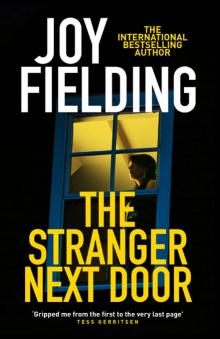 The Stranger Next Door
The Stranger Next Door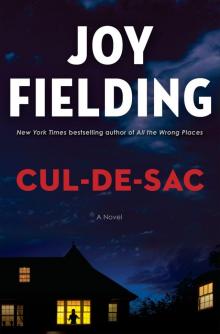 Cul-de-sac
Cul-de-sac The Final Act
The Final Act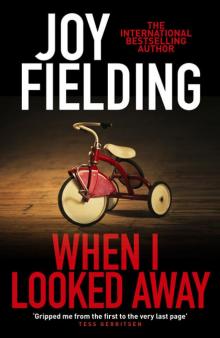 When I Looked Away
When I Looked Away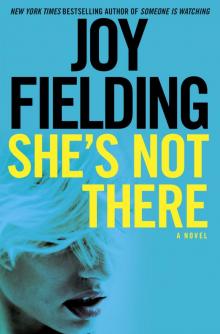 She's Not There
She's Not There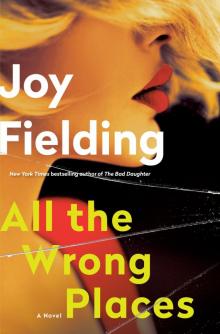 All the Wrong Places
All the Wrong Places Now You See Her
Now You See Her Don't Cry Now
Don't Cry Now Good Intentions
Good Intentions Still Life
Still Life Lost
Lost The First Time
The First Time Whispers and Lies
Whispers and Lies The Other Woman
The Other Woman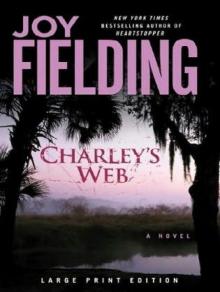 Charley's Web
Charley's Web Mad River Road
Mad River Road Puppet
Puppet Life Penalty
Life Penalty The Wild Zone
The Wild Zone Home Invasion
Home Invasion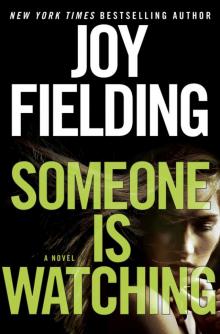 Someone Is Watching
Someone Is Watching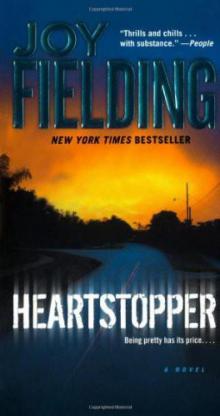 Heartstopper
Heartstopper See Jane Run
See Jane Run The Bad Daughter
The Bad Daughter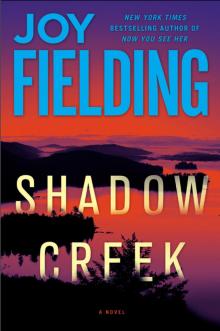 Shadow Creek
Shadow Creek Missing Pieces
Missing Pieces Kiss Mommy Goodbye
Kiss Mommy Goodbye Grand Avenue
Grand Avenue